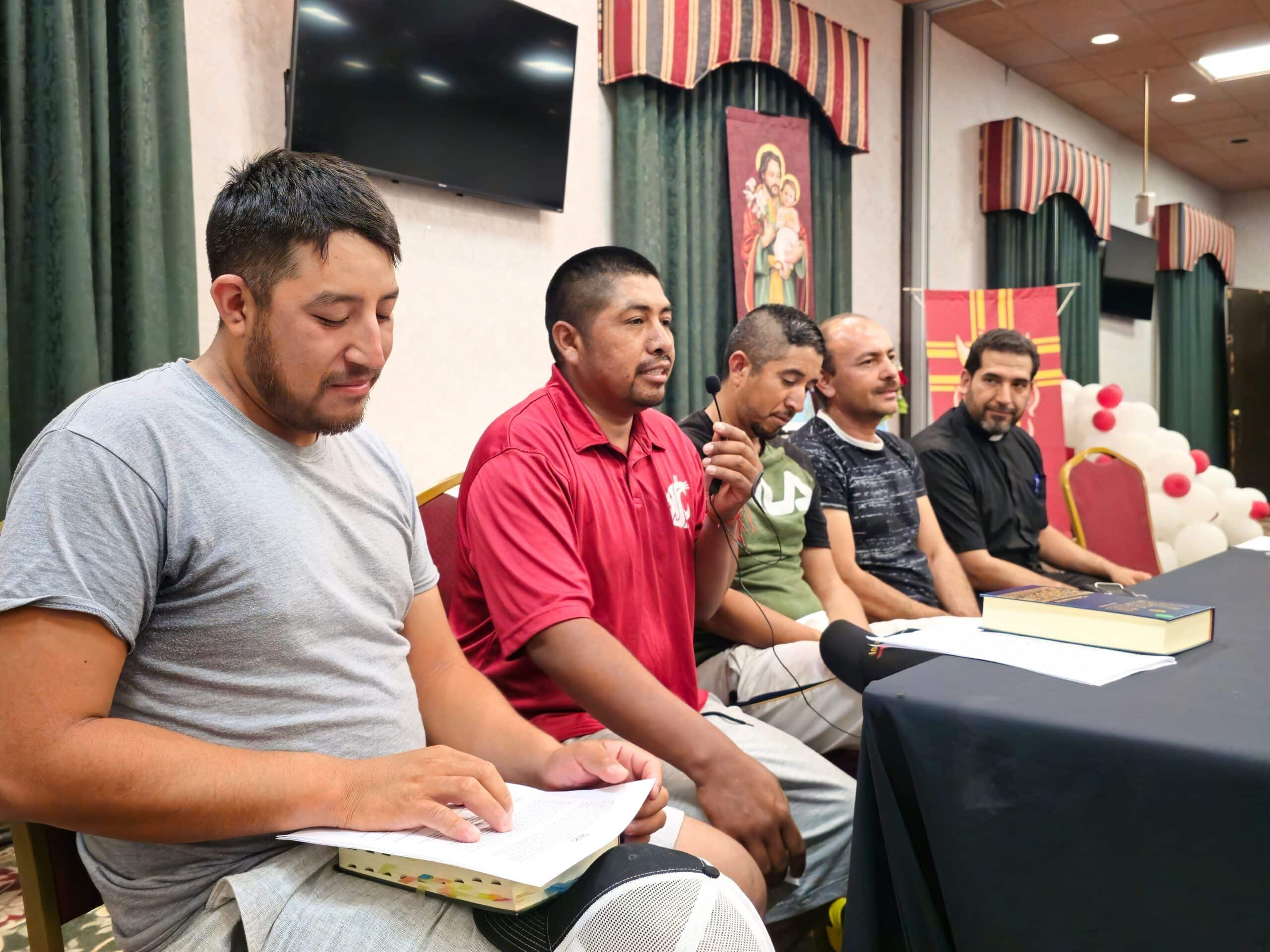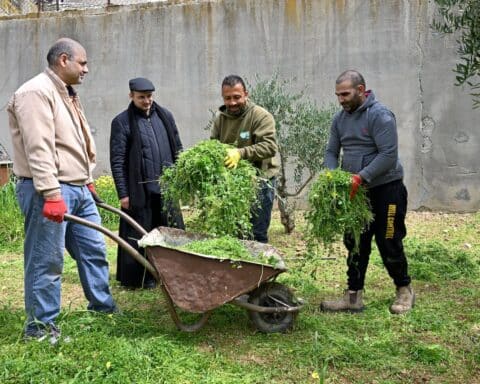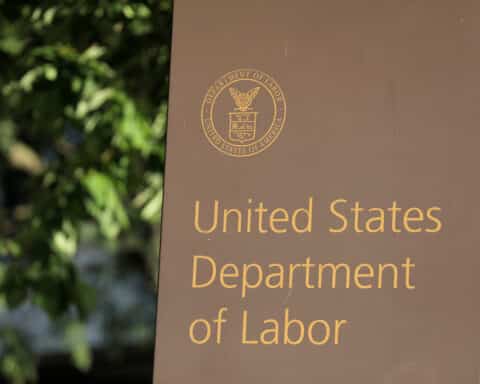YAKIMA, Wash. (OSV News) — “The church doesn’t have a mission; the mission has a church,” said Bishop Joseph J. Tyson of the Diocese of Yakima, not quite pounding the table. Later, he told the group, “Our migrant ministry is the model for all of our ministries — the parish is bigger than the building.”
A group of 24 modern apostles were able to witness a glimpse of this during an Aug. 28-29 pastoral visit organized by the U.S. Conference of Catholic Bishops’ Subcommittee on Pastoral Care of Migrants, Refugees and Travelers. Participants from the USCCB, the Catholic Migrant Farmworker Network and related ministries met in Yakima to witness, support, and learn from the migrant ministry carried out by the diocese.
During the visit — also considered an episcopal encounter with migrants under the title “Christ in the Heart of the Migrant Farmworker Today” — participants visited both the work and living sites of some of the Mexican-born agricultural workers who grow and harvest the fruit and vegetables that Washington state ships around the world.
Challenges workers face
The visiting delegation also had opportunities to talk to the workers and learn about their work, their challenges and their motivation to provide for their families back home. Helder Hernandez, the poverty, education and outreach coordinator of the USCCB’s Justice, Peace and Human Development office, told OSV News these conversations gave him a new perspective.
“It’s seeing them in the eye and recognizing that they are created in the image and likeness of God, and to know that they have a name, that they have a dignity given to them by God,” he said. “They are our brothers and sisters who deserve to live a dignified life.”
The State Department of Commerce reports that Washington is the largest producer of apples, blueberries, hops, pears, spearmint oil and sweet cherries, and the second largest producer of apricots, asparagus, grapes, potatoes and raspberries, in the U.S.
But the work is poorly paid, backbreaking, and low in status. Growers looking to hire have historically drawn those with few options, including some of Washington’s oldest residents — its Indigenous people — and its newest (including immigrants from Europe, Asia and Latin America at different times). In Washington, white Americans from rural and disadvantaged parts of the country were the primary labor pool until relatively late in the 20th century, according to a University of Washington report.
Separated from families and homes
While about 70% of farmworkers are year-round residents of Washington, and make up a substantial percentage of the Yakima Diocese’s Catholic parishioners, the rest either follow the harvest, or are here on an H-2A temporary agricultural visa. In either case, they are often separated from the support of their home communities for months at a time.
“They are homesick, anxious and can’t sleep sometimes,” said Father Jesús Mariscal, parochial vicar at St. Paul Cathedral in Yakima. “There is a lot of ministry to be done in these little communities. It is only by being there, that you can discover how to help.”
The diocese’s migrant ministry program began in the summer of 2011, soon after Bishop Tyson became Yakima’s shepherd. Encompassing seven counties in Central Washington, the Yakima Diocese serves about 176,000 Catholics in 39 parishes and three mission churches, with about two-thirds being Hispanic. During the harvest, an estimated 100,000 migrant workers reside in the region, according to the diocese’s episcopal vicar.
The delegation visited an orchard in nearby Zillah, where pickers, elbows flashing, were harvesting apples. Later, the group toured a fruit-packing plant.
A day in the life
The most riveting encounter for many participants was a visit to FairBridge Inn. Formerly a hotel, it now houses about 1,300 H-2A workers.
The workers’ H-2A visas are for temporary work only; the employer is required to provide employment opportunities for at least three-quarters of the number of hours in the job offer. Employers must provide housing for employees.
According to one of the workers who stays at FairBridge, about $108 is deducted weekly from each paycheck to cover the workers’ food, although the amount depends on the contract workers have with their employer.
At the hotel, a panel of four men who had left their families at home in order to work in Yakima described their lives. They get up early to catch a 5 a.m. bus that takes them to the orchards. They have two 15-minute breaks, a lunch period and are bussed back to FairBridge at 2:30 p.m., where dinner is served at 4:30 p.m.
Workers said they appreciate the evening activities organized by the church, especially Mass. One noted that in his native Mexico, he attends Mass weekly, but it is difficult to figure out how to find Mass when he is working here. Another said that it helps to have life be more than just work and the phone, and he enjoys taking English and guitar classes.
There are difficulties described by some of the workers. They explained the men are locked in the grounds for security purposes once they return at the end of the workday; they must ask permission to go to the store and are not allowed out to just take a walk. The fence around the property shocked the delegation.
Migrant camps house the families that follow the harvest as well as some H-2A workers. They may be a combination of tents, trailers, and other temporary structures.
Ministry to migrant workers
In Wenatchee, about a two hour drive from the city of Yakima, Sandra Barros of St. Joseph Catholic Church, described how they carry out ministry there. “We bring food, and diapers for the families, but most of all, we bring the sacraments.”
Many of the young people are not in one place long enough to receive a conventional preparation for first communion or confirmation. Barros has built a mailing list of 300 families since 2019, and she communicates with them year-round. “They feel we are with them,” she said.
Hernandez was also touched by how the workers establish a sense of community, especially through their faith. He added that the migrant ministry within the Yakima Diocese is a model for different areas of ministry because it centered on walking alongside migrants as brothers and sisters “to collectively build upon the kingdom of God on this land.”
The last stop of the pastoral visit was a migrant camp in Monitor, near Wenatchee, where the three bishops present — Bishop Tyson, and Bishop Eusebio L. Elizondo and Bishop Frank R. Schuster, both auxiliary bishops of the Archdiocese of Seattle — concelebrated Mass and the workers shared a feast with the delegation.
Esther Morash, who has been organizing Wednesday night Masses at the migrant camp for 15 years, which was the seed of the ministry locally, said, “I’ve never met nicer people than these farmworkers. When they leave, they always turn around and say, ‘thank you.'”





